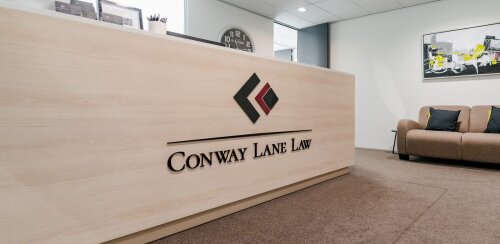Best Conveyancing Lawyers in Rangiora
Share your needs with us, get contacted by law firms.
Free. Takes 2 min.
Free Guide to Hiring a Real Estate Lawyer
List of the best lawyers in Rangiora, New Zealand
1. About Conveyancing Law in Rangiora, New Zealand
Conveyancing in Rangiora follows New Zealand wide rules for buying and selling real estate. The process covers contract creation, due diligence, title checks, and the transfer of ownership at settlement. Local practice is guided by national legislation and administered through the Land Information system and property registries.
The work is typically performed by a solicitor or licensed conveyancer who handles title searches, LIMs, and settlement coordination with lenders. In Rangiora, as in other Canterbury towns, the solicitor or conveyancer plays a key role in ensuring the title transfers correctly and any encumbrances are disclosed and resolved. This keeps property transactions compliant with the applicable laws and protects your interests.
In New Zealand, title transfers are registered with the land titles system administered by Land Information New Zealand (LINZ). LIM reports help buyers assess property-specific constraints before settlement.Source: LINZ - Land Information New Zealand
2. Why You May Need a Lawyer
- Title issues or encumbrances - A Rangiora property may have easements, covenants, or caveats not fully disclosed in the sale contract. A solicitor will review the title and ensure you understand restrictions before settlement. This helps avoid costly construction or use limitations after purchase.
- Complex contract terms or conditions - If the contract includes unusual conditions, such as subject-to-lease arrangements, restricted covenants, or special rates, a conveyancer can negotiate and clarify these terms. Clear wording reduces the risk of dispute if conditions fail or change.
- Rural or subdividable land concerns - Purchases of rural blocks or subdivision prospects often require council consents and compliance checks. A lawyer will verify resource consents, frontage rights, and boundary lines to prevent post-settlement issues.
- Estate or trust owned property - When the seller is a trust or company, the conveyancing solicitor checks corporate documentation and executor or director approvals. This ensures the sale is valid and that transfer proceeds smoothly.
- Probate or estate administration - If the property is part of an estate, a lawyer guides probate requirements and the sale process. They help you navigate the transfer from the estate to the purchaser with proper title vests at settlement.
- Financing and settlement coordination - Banks and mortgage lenders require a clear title and up-to-date compliance checks. A solicitor coordinates with lenders to meet settlement deadlines and ensure funds release.
3. Local Laws Overview
Conveyancing in Rangiora relies on national statutes that regulate property transfers, title registration, and professional conduct. Key laws include the Property Law Act 2007, the Land Transfer Act 1952, and the Lawyers and Conveyancers Act 2006. These statutes shape how contracts are formed, how titles are transferred, and how conveyancing professionals operate in New Zealand.
Property Law Act 2007 governs contracts for sale of land and property transfers; it remains central to NZ conveyancing practice.Source: https://www.legislation.govt.nz/
The Land Transfer Act 1952 provides the framework for registering title transfers and updating land records with LINZ.Source: https://www.legislation.govt.nz/
The Lawyers and Conveyancers Act 2006 establishes the regulation of lawyers and conveyancers, including licensing, professional standards, and disciplinary processes.
Source: https://www.legislation.govt.nz/4. Frequently Asked Questions
What is conveyancing in Rangiora?
Conveyancing is the legal process of transferring property ownership from seller to buyer. In Rangiora, a solicitor or conveyancer handles contract review, title checks, LIMs, and settlement coordination. This ensures a valid transfer of title and compliance with NZ law.
How do I start the sale and purchase process?
Ask a local conveyancer to review the sales contract, obtain a LIM, and run title searches. They will liaise with your bank, set a settlement date, and prepare documents for settlement day.
What is a LIM and why do I need it?
A LIM is a Land Information Memorandum detailing property constraints and planning information. It helps buyers assess zoning, easements, and consent requirements before purchasing.
How long does conveyancing take in Rangiora?
Typical timelines range from 2 to 6 weeks for a straightforward sale, assuming clear title and no finance conditions. More complex cases with caveats or consent requirements may take longer.
Do I need a lawyer to buy a house in Rangiora?
While not legally mandatory, a lawyer or licensed conveyancer reduces the risk of title defects and contract issues. They ensure correct transfer of title and compliance with NZ law.
How much do conveyancing fees cost in Rangiora?
Fees vary by transaction complexity. Expect preliminary costs for title checks and LIMs, plus fixed or hourly rates for contract review and settlement work.
What is title search in NZ?
A title search confirms ownership and reveals encumbrances like easements or covenants. It is essential before finalising any purchase to avoid surprises at settlement.
What are easements and restrictive covenants on a title?
Easements grant certain rights over land for others, such as shared driveways or utilities. Restrictive covenants limit how you can use the land. A conveyancer explains these and their implications.
When can I settle after the contract date?
Settlement occurs when the purchase price is paid and the title is transferred. The contract sets a target settlement date, often with a finance condition that can affect timing.
Where can I access official title information in Canterbury?
You can obtain official title information and LIMs through LINZ, which manages land titles and records for New Zealand.
Should I get a pre-contract due diligence?
Yes. A pre-contract due diligence review helps identify title defects, consent issues, and enforceable covenants before you commit to the purchase.
Is a mortgage required in the conveyancing process?
Most buyers finance property with a mortgage. Your solicitor coordinates the mortgage condition and ensures funds are available at settlement.
5. Additional Resources
- Land Information New Zealand (LINZ) - Administers land titles, LIMs, and official land records; useful for title checks and property information. linz.govt.nz
- The Law Society of New Zealand - Professional body for lawyers and conveyancers; provides practice standards and lawyer referrals. lawsociety.org.nz
- New Zealand Legislation - Official source for statutes such as the Property Law Act and the Land Transfer Act; contains current Acts and amendments. legislation.govt.nz
6. Next Steps
- Define your property transaction and budget; note whether you are buying, selling, or both in Rangiora. This clarifies the scope for a lawyer or conveyancer.
- Identify at least two local Rangiora conveyancers or solicitors and check their practice areas and experience with Canterbury properties. Gather contact details for initial consultations.
- Request a written engagement proposal or fixed-fee quote. Confirm what services are included and any disbursements such as LIMs or title searches.
- Prepare documentation for your first meeting. Bring ID, the signed sale agreement, and any known title or covenant information. This speeds up the initial review.
- Meet with the lawyer or conveyancer to discuss the contract, due diligence items, and timelines. Establish preferred communication methods and regular update intervals.
- Approve the engagement and sign a retainer. Confirm the expected settlement date and any conditions that must be met before settlement.
- Stay in regular contact during the process. If issues arise such as title defects or consent requirements, your lawyer will guide you on the best course of action.
Lawzana helps you find the best lawyers and law firms in Rangiora through a curated and pre-screened list of qualified legal professionals. Our platform offers rankings and detailed profiles of attorneys and law firms, allowing you to compare based on practice areas, including Conveyancing, experience, and client feedback.
Each profile includes a description of the firm's areas of practice, client reviews, team members and partners, year of establishment, spoken languages, office locations, contact information, social media presence, and any published articles or resources. Most firms on our platform speak English and are experienced in both local and international legal matters.
Get a quote from top-rated law firms in Rangiora, New Zealand — quickly, securely, and without unnecessary hassle.
Disclaimer:
The information provided on this page is for general informational purposes only and does not constitute legal advice. While we strive to ensure the accuracy and relevance of the content, legal information may change over time, and interpretations of the law can vary. You should always consult with a qualified legal professional for advice specific to your situation.
We disclaim all liability for actions taken or not taken based on the content of this page. If you believe any information is incorrect or outdated, please contact us, and we will review and update it where appropriate.









